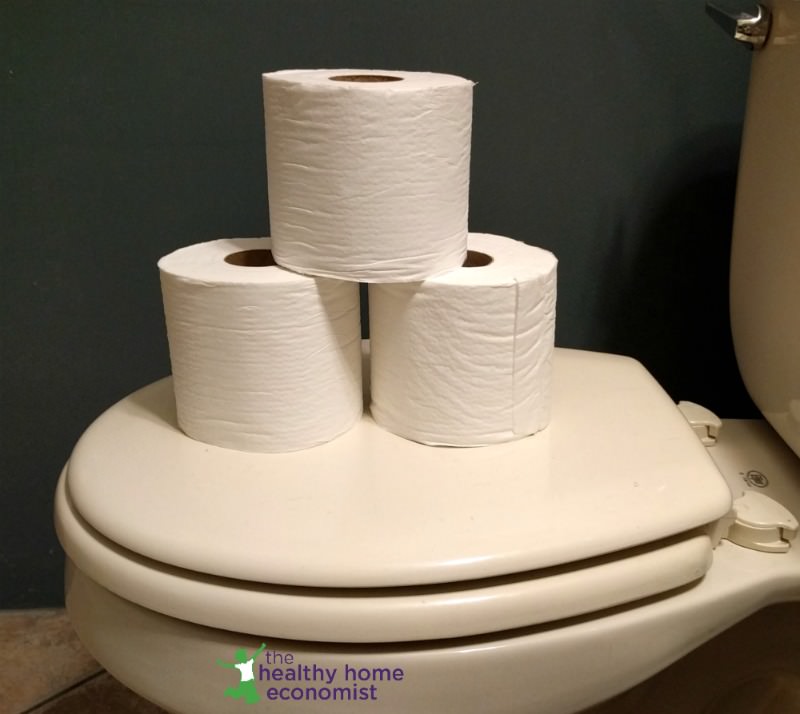Why using recycled toilet paper is dangerous to your health, and three green, nontoxic and sustainable alternatives to consider instead.

Like many of you good little girls and boys out there trying to be responsible citizens of Planet Earth, I bought recycled toilet paper in an attempt to be more environmentally conscious.
Alas.
This method of going green in the bathroom is not such a good idea after all. In fact, it is a most decidedly BAD idea.
Green does not necessarily mean healthy!
Recycled Toilet Paper is Toxic
Two studies published in Environmental Science & Technology have shown that BPA and cousin chemical BPS used in “BPA free products” but also highly estrogenic in nature, are much more pervasive in our common, everyday products than we could have imagined.
Yeah, that BPA free stuff is no better and will mess up your hormones just as much. But then, you sensed that was the case already didn’t you? I know I did.
The term “safe chemical” is kind of an oxymoron. If a product contains chemicals, just assume they are toxic unless proven otherwise.
How does all this relate to recycled toilet paper?
Hormone Disruptors in Recycled Paper
These two studies involved examination of hundreds of samples of paper from everyday items such as toilet paper, paper towels, napkins, newspapers, magazines, tickets, and even business cards.
Most of the paper samples tested contained the hormone disruptors BPA, BPS or BOTH.
How and why the paper was so contaminated is a question that requires further study to ascertain.
But for now, the key is to avoid thermal paper as much as possible. This stuff is the worst offender perhaps because it is often recycled and may somehow become contaminated during the reclamation process.
The ink itself may also be a culprit in the overall toxicity of recycled toilet paper.
In fact, it is best to avoid touching all recycled paper period! Sister chemicals BPA and BPS absorb very readily through the skin.
You don’t have to eat it to have them enter your bloodstream.
If your job involves handling thermal paper receipts, for example, best to wear gloves. And, if you can turn down receipts and instead rely on an online itemization of your expenditures, that would be a good step as well.
TP Used for Thin Skin Near Reproductive Areas
As for your backside, opt for toilet paper made from virgin pulp or better still, bamboo toilet paper.
This is an especially important area to protect from BPA and BPS as the skin in these areas is thin and delicate.
This means that the chemicals can more easily enter the bloodstream with very close proximity to the reproductive organs.
Green AND Safe Options to Toilet Paper
If you don’t want to change habits right now, at least switch to bamboo toilet paper (I suggest this brand). It is nontoxic and sustainably produced.
If you really want to go green with your toilet habits, skip the toilet paper entirely and invest in a bidet attachment for your toilet. They are very reasonably priced and easy to install.
If this European method of saving trees doesn’t work for you, your other option is to go the reusable TP cloths route.
Any of these approaches makes for a sanitary, nontoxic and sustainable bathroom experience.
Reference
(1) Bottom Line Publications, Toxic Toilet Paper? You Got It








Sorry… should say I have read the abstracts not the whole articles.
Have just read all the posts now and have had access to the articles. They don’t seem to say that recycled toilet paper is a problem. At least that’s how I read it. However, if you don’t want to use it and have a preference for what you think is best to use, then just use it. Fantastic debate here. Great to hear all the different points of view.
What is really gross is wiping your private areas with paper. Would you do the same with your hands, heck no you would wash with water!
You do not need to install an expensive bidet, get a plastic squirt bottle and get some pretty washclothes to dry with. THINK.
ARGH! It seems that we can never escape the chemicals!!! I’ve been buying BPA-free, but now that you’ve posted this article, it only makes sense that they would simply be replacing it with some other toxic junk. So what is the answer? Boycott plastics altogether? What else is BPA/BPS in other than plastics? I would have never guessed paper products.
Well, thank you for the information. But for me, there’s only so much healthy stuff I’m willing to do. I’m not too concerned with whether I use recycled paper or virgin paper, but I’ll still be using toilet paper, BPA or no. I’ve traveled extensively and had opportunity to use all different types of toilets, bidets, and paper around the world. I’ll stick with regular old U.S. toilet paper. Cloth is so repulsive it turns my stomach even to think about it. I do my part for the planet by accumulating only one tiny bag of trash every 2-3 months, and most of that is recycled. The planet will survive just fine, too; I’ve never been in any doubt about that. God designed it to support and sustain us. And we need to cut down a few more trees in this country…the state of forest management is disturbing.
Move to bidets! They are awesome and you can buy amazing products that fit right on to your toilet. http://reviewbidets.com/bidet-washlet-reviews/toto-bidet/toto-e200-jasmin-washlet-bidet/
Hi Sarah – Thank you for this information. Do you think the same applies to brown recycled napkins, like 7th Generation’s? Thanks!
ok, i bought a bidet today, anyone have any opinions? ‘family cloth’ will just not happen in my house for various reasons, but I love bidets so there you have it.
I want to switch to peri bottle or diaper sprayer for poops, and then dry with cloth. Hubby still claims it’s “gross”. *sigh*